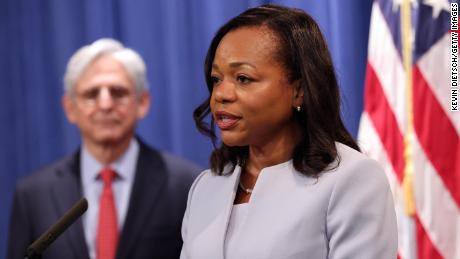It’s a political hot potato that is perhaps unprecedented in US history: How to proceed against an ally of a former President who is accused of dodging a congressional committee investigating an insurrection.
Garland, a former judge on the influential federal DC appeals court, has been hailed by President Joe Biden as “one the most respected jurists of our time.”
Garland pledged against partisanship at his confirmation hearing, telling senators: “I am not the President’s lawyer, I am the United States’ lawyer.”
His tenure atop the department has already attracted skepticism from the left. Those critics have been frustrated by the lack of public indications of Justice Department investigation into former President Donald Trump himself for the Capitol riot, as well as other seemingly Trump-friendly decisions like its effort to try shielding Trump from an unrelated defamation case.
Garland is scheduled to testify before the House Judiciary Committee on Thursday as the House prepares to vote to hold Bannon in criminal contempt.
Already, the matter has put Garland in an uncomfortable position, after Biden, when asked Friday whether witnesses should be prosecuted for not cooperating with the committee, said, “I do.”
The Department responded with a strikingly forceful statement that said that it makes “its own independent decisions in all prosecutions based solely on the facts and the law. Period. Full stop.”
That didn’t stop Bannon from taking a swipe.
“The Justice Department’s trying to unwind and walk back Joe Biden’s massive mistake,” Bannon said on his podcast, referring to the comment about the non-cooperative witnesses. “He says, ‘No, the all oughta be put in jail, they all oughta be criminal contempt,’ everything like that. That’s not the way it works, Joe.”
Bannon last week blew off a subpoena for private testimony from the House select committee investigating the Capitol attack. His fierce resistance to testifying or turning over requested documents has set him apart, according to lawmakers, from other witnesses whose cooperation the committee has sought. His lawyer has said his participation in the probe will not come until a court weighs in on Trump’s ability to assert executive privilege in the investigation.
The committee has pushed back on those legal arguments, noting that Bannon was not a government official during the period lawmakers are investigating, while touting January 5 comments Bannon made on his podcast predicting “all hell is going to break loose tomorrow.”
“Based on the Committee’s investigation, it appears that Mr. Bannon had substantial advance knowledge of the plans for January 6th and likely had an important role in formulating those plans,” Wyoming Rep. Liz Cheney — a Trump critic and one of two Republicans on the committee — said Tuesday.
Trump allies in Congress have embraced Bannon’s legal arguments for not cooperating, as they accuse the select committee of going after witnesses for engaging in constitutionally-protected political speech.
“(Committee Chairman Bennie Thompson) knows there are willing hands at the Department of Justice ready to receive such a referral and to criminalize our politics” Rep. Matt Gaetz said Wednesday at a hearing to consider the contempt vote.
Gaetz, a Florida Republican, is among the top promoters of Trump’s election fraud lies whose phone records the committee has indicated interest in investigating.
Promises to leave politics out of DOJ prosecution decisions
Garland has insisted that, in the federal prosecutions of the more than 600 alleged participants of the mob, prosecutors are “making determinations in every case about what charge fits the offense, what charge fits the law.”
His comments, at a New Yorker event earlier this month, came after one judge overseeing the cases suggested that prosecutors are going too easy on defendants. Another judge said the department lacked “credibility” because it had not sought to prosecute as aggressively violence associated with 2020 racial justice protests as aggressively as it had with the Capitol riot.
“I am quite aware that there are people who are criticizing us for not prosecuting sufficiently, and others who are complaining that we are prosecuting too harshly,” Garland said. “This is, you know, part of the territory for any prosecutor in any case.”
In a statement Tuesday, the DC US Attorney’s office said that it would evaluate any contempt referral sent to it by the House “based on the facts and the law.”
Even before his confirmation to the department, Garland was well acquainted with the political firestorms that tend to erupt from the Hill.
His 2016 nomination by President Barack Obama to the Supreme Court seat vacated after Justice Antonin Scalia’s death was met with a several monthslong blockade by Senate Republicans that left the seat open for Trump to fill.
In the face of plans already made clear by Republicans to stall his nomination, Garland said at the time that “trust that justice will be done in our courts without prejudice or partisanship is what, in a large part, distinguishes this country from others.”
Garland’s self-proclaimed rejection of partisanship is now on close examination as his department weighs the Bannon referral.
“The one thing you can be sure of is Merrick Garland is not going to make a decision based on political calculations whatsoever,” Seth Waxman, a former solicitor general and longtime colleague of Garland’s, told CNN.








